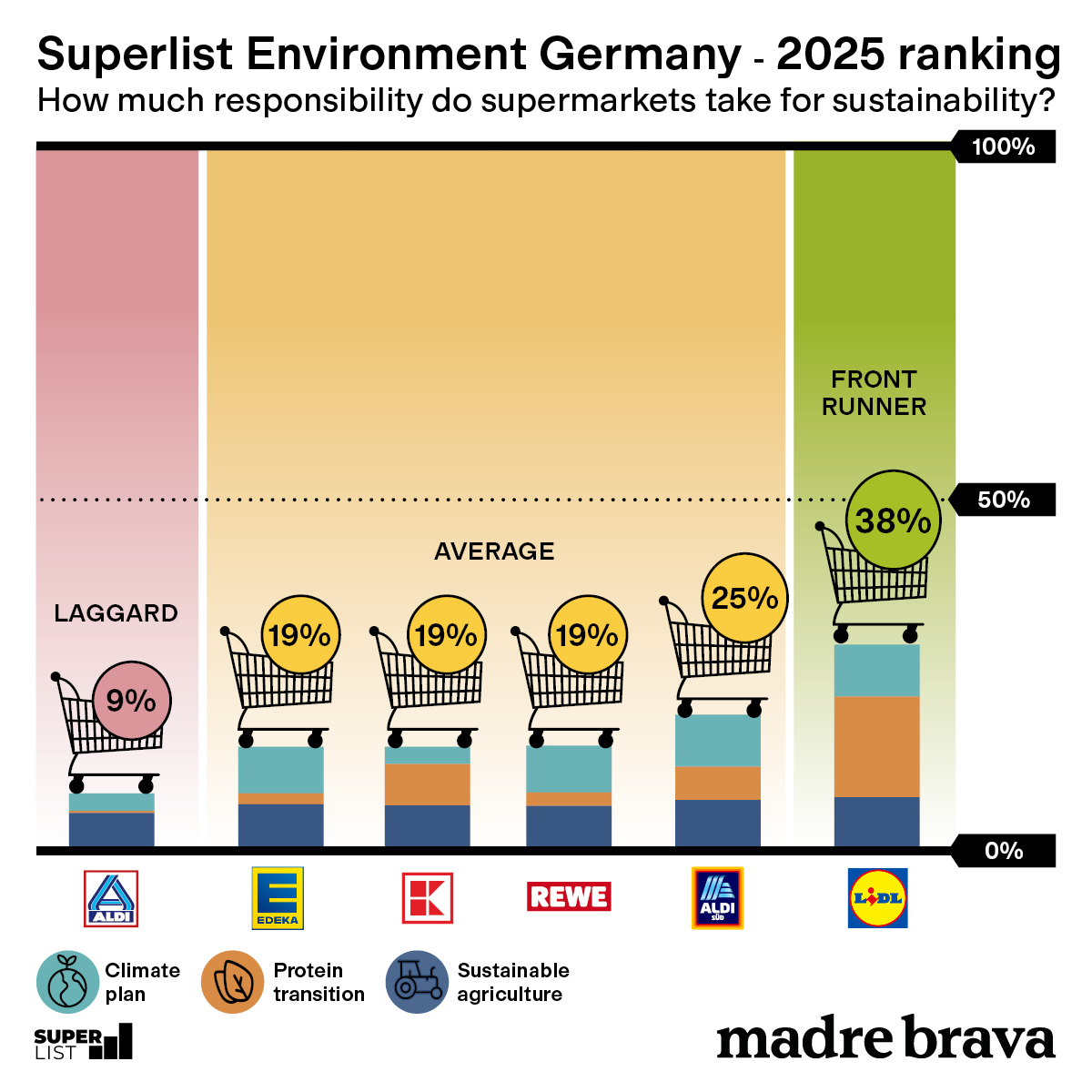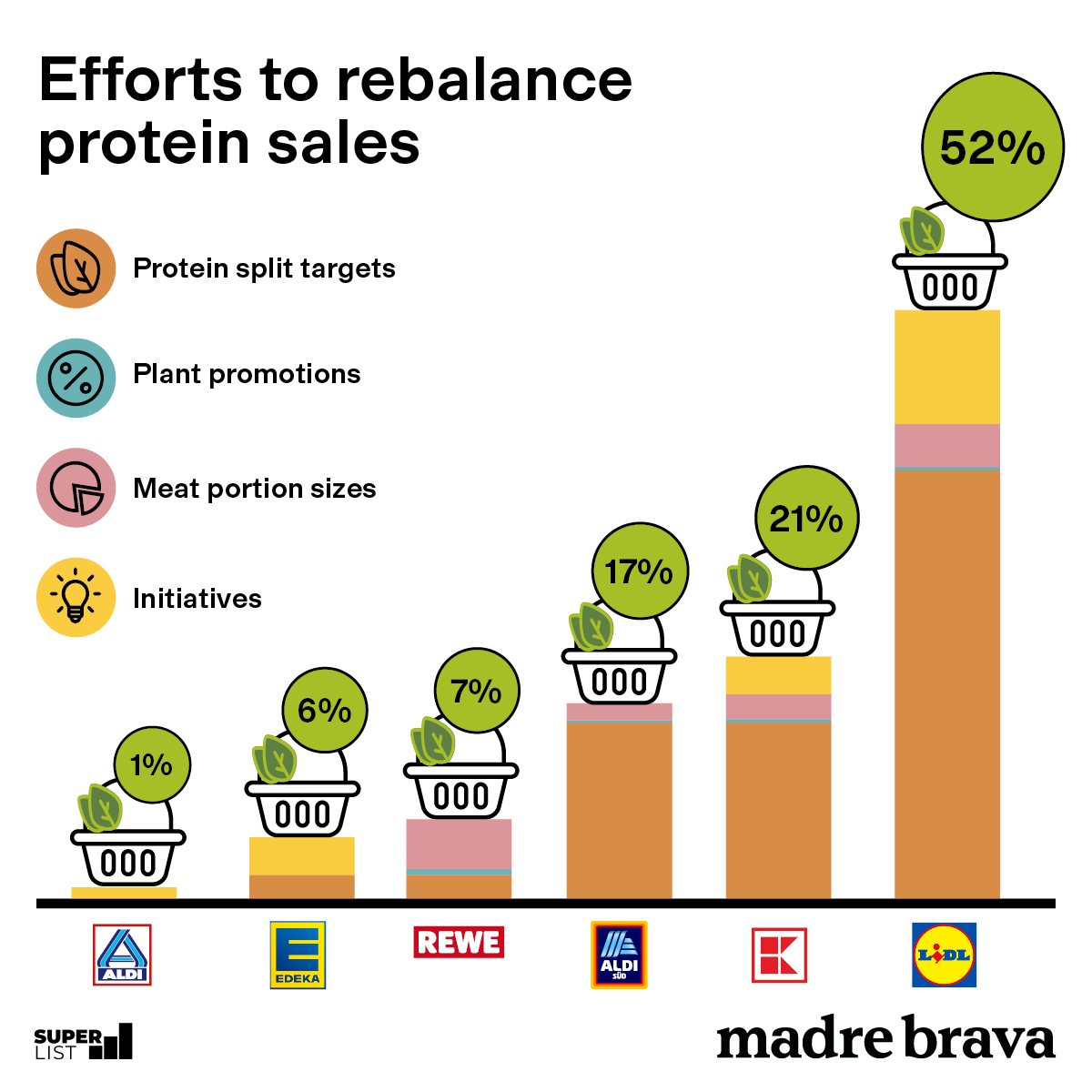
‘Superlist’ ranks German supermarkets’ sustainability
A new sustainability ranking for German supermarkets was released today.
The ‘Superlist Environment Germany’, produced by the European think tank Questionmark Foundation, picked out Lidl as the front runner, with Aldi Süd at its heels. The supposedly premium retailers Edeka and Rewe were significantly behind and Aldi Nord was ranked as a laggard.
Overall, the ranking paints a picture of an industry with strong sustainability targets but a lack of specific plans and strong measures to meet them.
The Superlist, which was developed in association with Albert Schweitzer Foundation, Madre Brava, the Physicians Association for Nutrition and ProVeg, assessed supermarkets’ efforts on becoming a Net Zero business, encouraging plant-based over animal-based food sales, and stimulating sustainable agriculture practices.
Supermarkets showed ambition with their climate goals and plant-based protein sales targets. But, looking beyond these targets, researchers found that comprehensive climate roadmaps were still missing, animal proteins accounted for 90% of protein promotions and none of the supermarkets were transparent enough about the share of sustainably certified products in their assortment.

The shift towards more plant-based sales is one of the most effective ways to reduce the negative environmental impact of the food system. In general, plant-based dietary patterns have a lower negative impact on the climate, the environment, human health and animals.
Lidl’s front runner status in the Superlist was largely down to its clear commitment to rebalance protein sales, shifting a proportion of its animal-based food sales to plant based. It was followed by fellow discounter Aldli Süd and both led the ‘full range’ supermarket chains Rewe, Edeka and Kaufland. Aldi Nord was ranked last because of its failure so far to report or act effectively enough on its greenhouse gas emissions directly related to food.

Madre Brava’s Senior Associate in Germany, Florian Wall, said: "Selling more plants and less meat and dairy is a triple-win proposition for retailers and their customers: it improves shoppers’ health through more balanced eating, increases profitability, and cuts emissions and nature destruction.
“Lidl leads the pack as the only retailer with a target to rebalance protein sales to achieve human and planetary health goals. Rewe recently announced the same admirable aspiration but no ambitious, time-bound target. Rewe Group’s CEO should show leadership by rebalancing protein sales for the sake of the planet, his shoppers’ health, and his business.”
Despite progress from some on protein sales, animal products still accounted for over 90% of protein promotions across the board and nearly 70% of ready-to-eat meat products, such as schnitzels, were extra large (over 150 grams). The Planetary Health Diet, a global reference diet that is healthy for both planet and people, recommends consumers eat only about 100 grams of red meat per week.
Germans buy more than 70% of their food in supermarkets, so the food retailers hold significant power over the consumption and production of food in Germany and beyond.
So it was heartening that researchers also found some positive developments. Edeka, Kaufland and Lidl committed to offering private label plant-based alternatives for the same price as animal-based counterparts and Lidl made it easier for customers to choose plant-based products by placing them between meat products.
Netherlands-based Questionmark compares supermarkets' efforts on health, the environment and human rights, throughout Europe. The think tank has established Superlists in the Netherlands, Belgium, Sweden, and the UK.
The German Superlist, focused on environmental sustainability, is likely the first in an annual series ranking supermarkets in this way.
You can find the full Superlist here: In English | In German
The supermarkets featured in Superlist Germany were consulted on the Superlist’s methodology, and the data that was collected.



